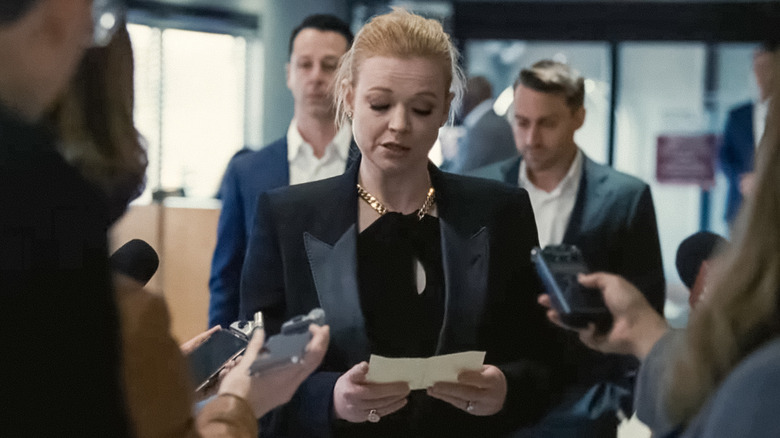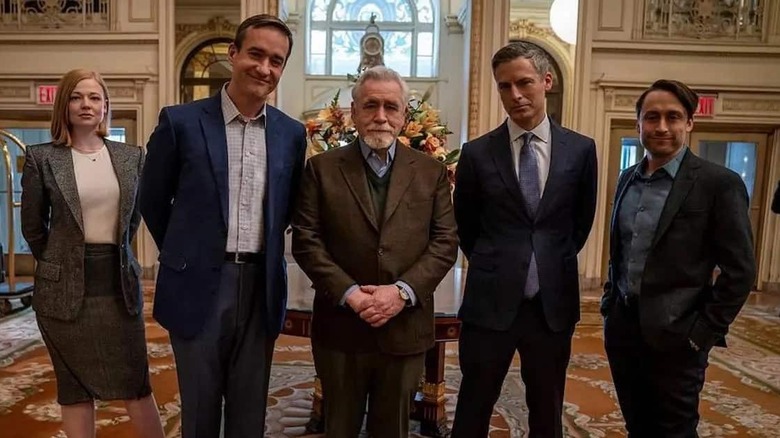Succession's Writers Did Some Deeply Grim Research For A Pivotal Shiv Scene
One of the most obvious bits of trivia regarding "Succession" is the fact that its characters are based on the Murdoch family. Rupert Murdoch, the elderly conservative billionaire who's been running News Corp (proud owner of Fox News) for decades, is clearly the inspiration behind Logan Roy. "Succession" creator Jesse Armstrong even said at the Edinburgh TV Festival this year that the "predecessor" to the show was "a script [I wrote] about Rupert Murdoch and his family — the real people." And although the battle for succession amongst Murdoch's adult children hasn't been quite as dramatic as it's been for their HBO counterparts, there are plenty of other details the show has drawn from.
Shiv Roy was evidently inspired by Elisabeth Murdoch, a woman who apparently felt constantly overlooked by her family as a serious, capable business leader. Like Shiv, Elisabeth tried to branch out from the family and start her own independent company, only for News Corp to buy it and drag her back in anyway in 2011. "This initially brought her into a more prominent position in the family business," Time reported, but her influenced was soon "diminished," and "she stepped away from day-to-day operations." I'm sure Shiv could relate to this general life trajectory.
But when it came to "Connor's Wedding," the game-changing third episode of season 4 in which Logan dies suddenly, Shiv has a character moment near the end inspired not by Elisabeth Murdoch, but by Ghislaine Maxwell, the woman who was found guilty of child sex trafficking in connection with the late Jeffrey Epstein. Although Shiv herself is not a sex trafficker, when she's put in the position of breaking the news of Logan's death to the press, her situation paralleled Maxwell's life in a surprising way. In 1991, Maxwell's own father died suddenly by falling (or jumping, or possibly being pushed) off a ship, and it was her job to make a statement to the press.
Tactically breaking bad news
"Ghislaine Maxwell, after her father died, she gave a statement in — I think it was the Canary Islands where the boat went back to. [Robert Maxwell]'s a British media mogul who died falling off, or jumping off, the back of his yacht," showrunner Jesse Armstrong explained in the official HBO "Succession" companion podcast. "It's that moment where they have to go public. I think they do not a bad job. She wants to express some public sentiment, but they also need to make that statement to calm the markets."
Although the "they" and "she" Armstrong's referring to here are the Roys and Shiv respectively, they also apply to Ghislaine, whose speech after her father's death had the same basic tone and delivery. Ghislaine was required by decorum to stay composed and polite throughout her statement, but she was clearly still upset and struggling to stay fully calm.
"Ghislaine now needs no introduction, right," said Armstrong, "but at that point [she] was just [Robert Maxwell's] favored daughter." Even knowing the terrible crimes Ghislaine Maxwell would go on to commit, it's still hard to watch the 1991 speech and not have a little bit of sympathy; almost all of us have lost a loved one at some point or another and can relate to what she's going through. Likewise, as much as some fans have despised Shiv over the series, for her questionable treatment of her husband Tom and her intimidation of a sexual assault victim, those feelings washed away for at least a moment as we saw her struggle through that speech. Much like Roman's funeral breakdown or Kendall's breakdown in the season 3 finale, it's hard to stay mad at these characters when they're clearly feeling this much pain.
But how fair is the Ghislaine comparison?
Of course, Armstrong wasn't claiming Shiv was on the same level of moral depravity as Ghislaine Maxwell, nor that he necessarily sees her as a Maxwell-esque figure outside of this one specific moment. Still, it's hard not to wonder what spurred this comparison in the first place. The fact that Maxwell came up at all in the writer's room is a pretty enlightening bit of information about the show's understanding of its characters. The Roy family is terrible and the show itself has always known that, but how bad exactly does it think they are?
If the Maxwell inspiration is any indication, it might be more than we thought. Maybe it's a sign that the ongoing cruise scandal, which the characters constantly downplay throughout the seasons, was even more heinous than has been implied. Add in the "Moe Lester" jokes and the relative ease with which Shiv convinced a victim not to testify, and maybe the Maxwell comparison wasn't as out-of-pocket as it might've seemed.
Most of all, the comparison seems to foreshadow the darker direction the Roy siblings would go throughout the rest of the season. Roman and Ken help elect a fascist, a new low even for these two, and Shiv herself forms a self-serving alliance with the same fascist the very next day. It's hard to actually measure the sheer level of damage to society done throughout "America Decides," but we know that the events inside Waystar during election night would be the subject of scrutiny and conspiracy theories for years to come. With Shiv's ongoing connection to the corruption-ridden Waystar, and the many skeletons in her closet already, it's possible she would ultimately become an infamous public figure in her own right.


